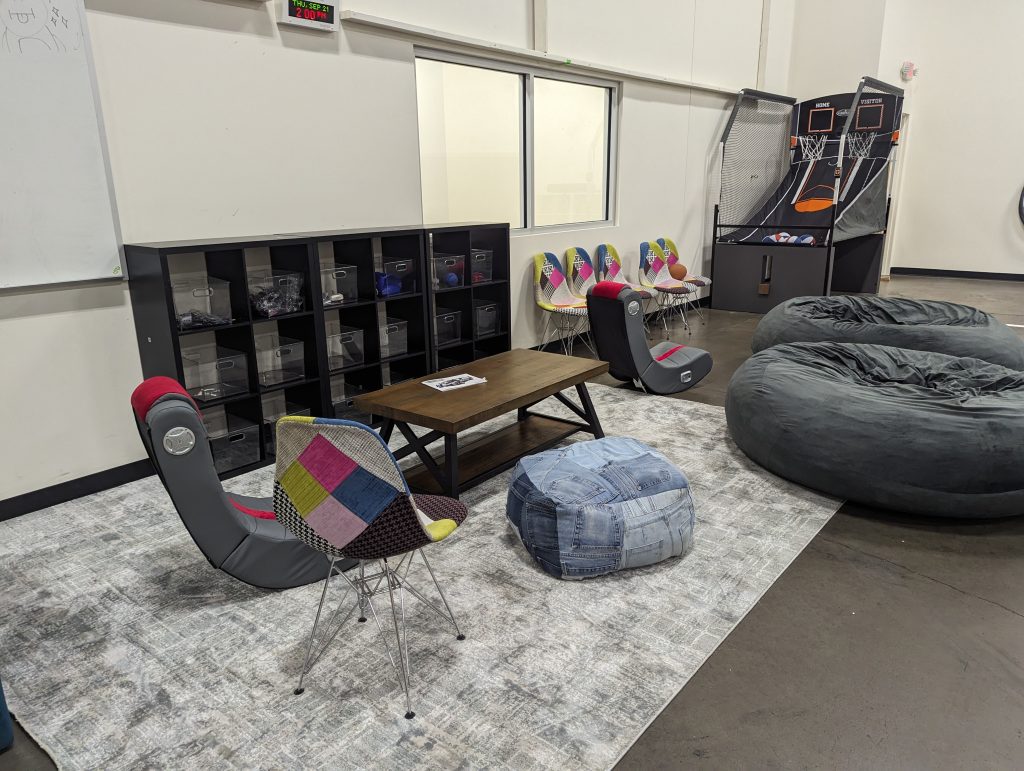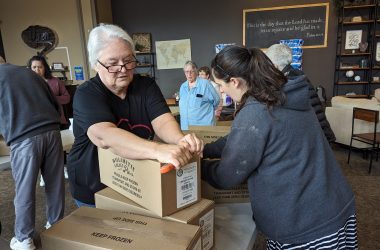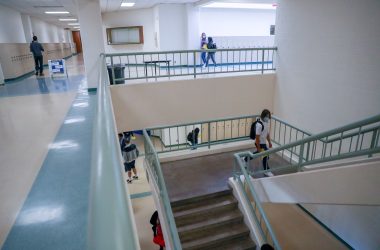Bean bags are a key part of the curriculum in Salem’s newest career program.
Two large ones sit next to several gaming chairs and cubbies in a carpeted area at the Career Technical Education Center in northeast Salem. It’s the “teen area,” one of four settings in a large hanger designed to help future therapists and social workers get acquainted with the settings they’re likely to work in.
“It helps you connect to what you’re learning,” said Scarlett Kiracofe, a junior from West Salem High School. She said the nearby play structure in the kids area reminds her what her own childhood was like, which helps make lessons on human development stick.
The behavioral health program opened this fall at CTEC, drawing 60 juniors and seniors from across the Salem-Keizer School District. It’s intended to prepare the future workforce for a field that’s in demand across Oregon and the U.S.
Social worker Erin Dannecker, one of the instructors, was attracted to the program for its unique focus on social service agency work. Most career programs with a mental health component are focused on the medical side of care.
“There aren’t a ton of programs that are doing this,” she said. Dannecker came to the district from Polk County behavioral health, where she worked as a therapist and supervisor.

Students in the program are learning about ethics and values for behavioral health work, as well as the various settings that work takes place in the community. The hope is to expose students to the variety of careers available in settings like addiction treatment, child welfare, personal support or mental health therapy.
Makenna Moore, a junior at McNary High School, grew up around people struggling with addiction. She’s interested in a career where she can help kids in similar situations.
“I feel like this program offers a lot of order in the disorder of things,” she said.
Three weeks into the school year, students have spent considerable time learning about self-care through strategies like meditation, yoga and reflection. It’s a way to learn strategies they might use with clients, as well as reducing burnout. Being able to put on your own oxygen mask before helping others was something people working in the industry emphasized while helping design the curriculum, principal Rhonda Rhodes said.
“You have a lot more longevity in this field if you can do that,” she said.
One of CTEC’s selling points is hands-on experience. Auto body students work on real cars, cosmetology students cut hair and paint nails, and construction students build a house.
Behavioral health presents unique challenges to that model: unlicensed teenagers can’t provide therapy, interview abused children or be part of a crisis response team.
Instead, students are focusing on ways to proactively provide help to classmates at their high schools. Moore is working to provide resources for students struggling with eating disorders, an issue fellow McNary students have raised with her.
Rhodes said students may also work in peer mentoring roles, or put together practice treatment plans.
“They’re really proactive and they care really deeply and they want to help,” she said of the students.

CTEC opened in 2015 with space for 10 career programs, adding two per year until 2019. The behavioral health program was supposed to take over space vacated by the drone program, which was due to move to a hangar at the Salem Municipal Airport this fall and expand into a more comprehensive aviation program. But that move has been delayed as renovations continue at the airport.
Rhodes instead opted to replace CTEC’s business program, which she said has never been more than half full. The district’s six high schools all offer some form of business program, so she reasoned students could still learn about the field elsewhere.
Students said they feel school is more collaborative in the program than what they’re used to. They worked with educators to come up with cell phone policies, recognizing that there are times that call for no phones or earbuds, and times when students might be able to focus better on work if they’re able to listen to music.
“It provides us with an opportunity to say, ‘This is what I need,’” Moore said.
Kiracofe said the fact people choose to be in the program improves the experience.
“I feel like that gives you a better sense of mind,” she said.
Contact reporter Rachel Alexander: [email protected] or 503-575-1241.
SUPPORT OUR WORK – We depend on subscribers for resources to report on Salem with care and depth, fairness and accuracy. Subscribe today to get our daily newsletters and more. Click I want to subscribe!

Rachel Alexander is Salem Reporter’s managing editor. She joined Salem Reporter when it was founded in 2018 and covers city news, education, nonprofits and a little bit of everything else. She’s been a journalist in Oregon and Washington for a decade. Outside of work, she’s a skater and board member with Salem’s Cherry City Roller Derby and can often be found with her nose buried in a book.









